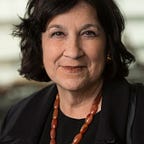My mother was a Holocaust survivor, but she was always more worried about my happiness.
“It will be harder for you to be in prison than it was for me to be in a concentration camp.”
My 93-year-old mom, who survived the Holocaust, died of COVID-19 in an assisted living facility in New Jersey on April 5. I found out she was dead from a text with the words Baruch Dayan Haemet, the Jewish blessing at the time of death.
Only days earlier, my nephew called to tell me she had pneumonia, and had been tested for COVID-19. When he called back two days later to tell me she was rushed to the hospital because her oxygen level was poor, she was struggling to breathe, and her temperature was high, I knew my family would face the single most difficult decision any family has to make.
Do we let her get admitted into the hospital, where she would be put on an IV and a breathing machine? Was it likely she would pass away alone in a hospital, the one place she truly hated? Or would we instead decide to let her pass away in a hospice, in her own bed, surrounded by pictures of her family? The decision was hard and easy. Hard because it meant I was going to lose my mother, and easy because we all knew her preference.
She died within two days. I wanted to be with her, but was told that because she tested positive, no visitors were allowed. It meant I couldn’t be with my mother at the end of her life. I couldn’t hold her or touch her.
